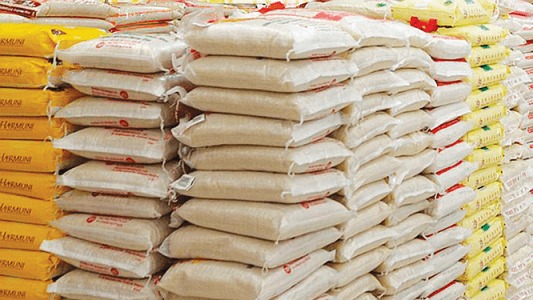PAG Felicitates Muslims on Commencement of Ramadan Fast
February 18, 2026TOP TEN MUSLIM UNIVERSITIES IN AFRICA
February 14, 2026ANALYSIS: Why Nigeria GDP is not the best in Africa Despite having the largest market
February 10, 2026Rice Remains Restricted Despite Lifting Of Forex Ban – Customs
Rice Remains Restricted Despite Lifting Of Forex Ban – Customs

Despite the skyrocketing cost of rice and the recent halt on the ban of foreign exchange for its imports, the crop is still a restricted commodity, the Nigeria Customs Service has declared.
Rice, a staple food widely consumed in Nigeria, has been rising in price despite its production locally. The commodity now sells for between N55,000 and N60,000 for a 50kg bag, depending on the area of purchase.
Its price was around N30,000 for the same 50kg bag about a year ago, but the cost has maintained a northward drive despite the local production of rice and the recent lifting of the ban on forex for the importation of rice into Nigeria.

It was reported on October 12, 2023 that the Central Bank of Nigeria had lifted the ban on importers of 43 items restricted from accessing foreign exchange on its official platform. Rice is among the items.
Many Nigerians had expected the cost of rice, particularly the imported ones, to crash following the announcement by CBN. But on the contrary, the cost of the staple has continued to rise.
Although domestic producers of rice said the high cost of production was a major reason for the rise in the cost of the commodity, it was gathered that its imports were still very limited due to the restriction on the product by the Nigeria Customs Service.
The NCS insisted that rice, as a restricted item, would be confiscated if imported via the country’s land borders, stressing that the lifting of forex ban on 43 items by the CBN did not stop rice from being a restricted commodity.
“What is the relationship between the removal of forex on restricted items, vis-a-vis fiscal policies of the government? They are different things. Rice is a restricted item. So, if it is a restricted item, it remains restricted,” the NCS spokesperson, Abdullahi Maiwada, told our correspondent.
He continued, “There is a difference between restriction and prohibition. And there is a difference between absolute prohibition and prohibition by trade. Somebody who is in tune with how these import and export processes are done must know what these terminologies are.
“How many tonnes of rice do we produce in Nigeria? Those are the things to find out, not to ask me why the price is going high. Rice is a restricted item and that is why it is being intercepted.
“If you import rice through the land border it will be confiscated because it is a restricted item. The way vehicles cannot come in through the land border, is also how rice cannot come in through the land border.”
Maiwada insisted that the restrictive policy of the government on the commodity had not changed, adding that if there was any change in the policy it would be communicated to the public by the customs service.
He said, “If there is a change in policy, we will tell you. If today the government says vehicles can come in through the land borders, we have to inform you by telling you that the government has lifted the ban restricting the importation of vehicles through the land borders and you can then import vehicles.
“Also, some people are talking about frozen poultry products, and these are products under the import prohibition list. Go and check our website, see the import and export prohibition list, you will see that live birds and poultry products are under the prohibition list.”
END.








